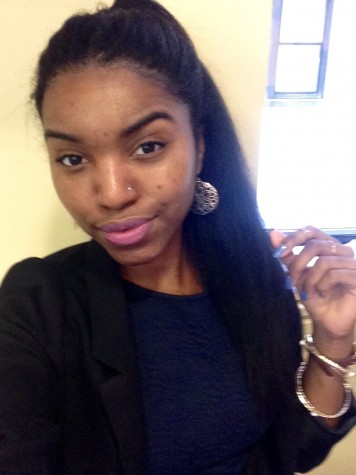First Time Voters Will Likely Impact 2016 Election Results
The countdown has begun for first-time voters choosing the next President of the United States.
The millennials, who are now eligible to vote in 2016, grew up during Barack Obama’s presidency and will have the chance to decide who the next leader of the country will be next November.
Doing anything for the first time can be daunting, as one considers if they have prepared enough for it. This feeling is what some first time voters are experiencing.
Rubieliny Calderon, sophomore psychology major, expressed her reservations about voting in the upcoming election.
“I want to be politically educated and pay more attention to the candidates. Even though it’s one vote, it has an impact,” Calderon said.
Polls have shown the power young voters have in determining the president. In 2008, Obama captured 66 percent of young voters between the age of 18-29, according to exit polls conducted by NBC News. His opponent, John McCain, had only 31 percent of the young voters.
In 2012, President Obama won his re-election with the help of young voters as well. According to the National Exit Poll conducted by Edison Research, President Obama had 60 percent youth vote while Mitt Romney captured 36 percent.
Yet early indications state that current college students will not be as involved in the upcoming election. According to the U.S. Census bureau, voters from the ages 18 to 24 have annually seen their participation fall below every other age group since 1962. The voting data states that less than half of the eligible voters will actually cast a ballot.
The 2016 presidential candidates are Ben Carson, Donald Trump, Jeb Bush, Marco Rubio, Ted Cruz, Hillary Clinton, Martin O’ Malley, and Bernie Sanders. All candidates have been making news headlines, some more than others for various reasons.
The current favorites for college students thus far, according to early polling numbers, are Sanders and Clinton.
While some college students in this demographic may feel that their vote doesn’t count – the 2012 election actually tells a different story. Without their participation, there would currently be a different President of the United States.
“If you started the voting age at age 30, governor Mitt Romney would be president today,” says Alex Smith, the National Chairman of the Republican College National Committee, to USA Today. “That is how impactful our generation was in deciding a whole course of a presidential election.”
Republican candidate Donald Trump has sparked controversy over wanting to deport 11.3 million undocumented workers and terminate the automatic citizenship for children born to non U.S. citizens if elected president, according to Forbes.com.
Sophomore social work major Julissa Vasquez is headstrong in her support of Hillary Clinton for president and not Donald Trump.
“I want Hillary to win. I disagree with Trump. He wants to get rid of immigrants. I’m first generation Dominican-American, I don’t think it’s right what he wants to do. We live in a free country,” Vasquez said.
Democratic candidate Clinton has made headlines regarding her emails. The former Secretary of State used her private email server for all official email communications during her time in the White House. Clinton surrendered her personal email server and thumb drives to the FBI for investigation. An Inspector General discovered two classified emails from work-related emails should have been labeled “top secret.” “They contain code words indicating some of the information came from satellite intelligence,” as stated on NBCNews.com.
Carson, former neurosurgeon and current Republican candidate, has voiced his opinion against journalists who have scrutinized the stories he told about his youth. Certain aspects of Carson’s childhood has been up for debate that he retold in his biography, including his difficult childhood and military scholarship. While speaking to ABC, Carson defended himself by suggesting inaccuracies maybe in the retelling of his younger years.
“Show me somebody, even from your business, the media, who is 100 percent accurate in everything that they say that happened 40 or 50 years ago,” Carson stated.
Presidential candidates have their entire lives looked at once they make the decision to become the leader of the free world. It will be interesting to see what young voters consider about each candidate when deciding who to elect. They may take into consideration the news headlines about them.
First-time voters consider the changes they want to see when electing a president. The issues that a majority of young voters care about include are lowering tuition, economic stability after college, and combating climate change.
Junior business management major, Zakyra Allen, discussed the changes that she wants the next president to enforce.
“I would like to see the cost of college tuition go down. I might not be able to benefit from those changes but the generation after me should be able to,” Allen said.
Social media has become a daily part of most young voters’ lives and the means of how they get information about the upcoming election. Shared videos of candidates at various rallies and press conferences have circulated on Facebook, Instagram, Twitter, and YouTube. Allen shares that she gets updates about the candidates through what people share on social media.
“Honestly, I hear everything from social media. I don’t really watch the news but I’m always on my phone. I learned about what’s going on with Hillary Clinton and Donald Trump through there.”
So, in less than one year, first-time voters will have their chance to speak their minds. They will have to take into account all the information gathered about each candidate in order to make a final decision. Some maybe nervous while others have been ready to step up to the plate.

Shantal Marshall is from Brooklyn, New York and majors in journalism at Mercy College. Her hobbies include reading O magazine, listening to music, and...








